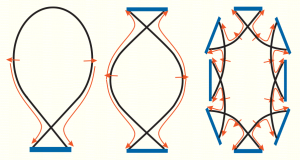Divertor: Difference between revisions
Jump to navigation
Jump to search
No edit summary |
No edit summary |
||
| Line 6: | Line 6: | ||
<ref name="Feng"></ref> | <ref name="Feng"></ref> | ||
The term 'divertor' can | The term 'divertor' can refer to: | ||
* the magnetic field structure beyond the X-point and in contact with material surfaces, or | |||
* the material structure intersecting the 'outgoing legs' of the magnetic separatrix surface. | |||
The divertor region between the 'outgoing legs' - the region between the material divertor and the X-point, up to the separatrix - is known as the private flux region (PFR). | |||
== See also == | == See also == | ||
Revision as of 18:59, 15 February 2010

A divertor configuration is a magnetic field configuration in which the toroidally confined (plasma) region is separated from the outside world by a separatrix - as opposed to a limiter configuration in which the plasma's Last Closed Magnetic Surface is determined by the intersection of field lines by a material object.
One can distinguish 'tokamak divertors' (characterised by toroidal symmetry and one or two X-points or 'nulls') and 'island divertors' (for stellarators). [1]
The term 'divertor' can refer to:
- the magnetic field structure beyond the X-point and in contact with material surfaces, or
- the material structure intersecting the 'outgoing legs' of the magnetic separatrix surface.
The divertor region between the 'outgoing legs' - the region between the material divertor and the X-point, up to the separatrix - is known as the private flux region (PFR).